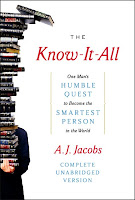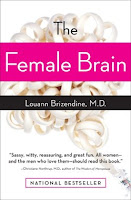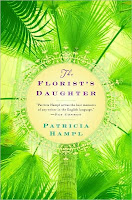 The next book on my list is The Year of Living Biblically: One Man's Humble Quest to Follow the Bible as Literally as Possible, by A.J. Jacobs. If you read Esquire (or EW before that), you know (editor-at-large) Jacobs' work. He's pretty hilarious. Before I start blogging about The Year of Living Biblically though, I thought I should post about his previous book: The Know-It-All.
The next book on my list is The Year of Living Biblically: One Man's Humble Quest to Follow the Bible as Literally as Possible, by A.J. Jacobs. If you read Esquire (or EW before that), you know (editor-at-large) Jacobs' work. He's pretty hilarious. Before I start blogging about The Year of Living Biblically though, I thought I should post about his previous book: The Know-It-All.I enjoyed this book so much. His wit, his humor, his candor made me laugh out loud so many times. Jacobs took a year to read the Encyclopedia Britannica from beginning to end. The book is broken up by entries in the Encyclopedia, and Jacobs explains how many entries affected him - or whether they did at all.
If the book wasn't packed away for a big move we have coming up, I'd provide an example or two. Maybe in a month or so. For now, here's the review from Publisher's Weekly:
Imagine, the original Berserkers were "savage Norse soldiers" of the Middle Ages who went into battle stark naked! Or consider the Etruscan habit of writing in "boustrophedon style." Intrigued? Well, either hunker down with your own Encyclopædia Britannica, or buy Esquire editor Jacobs's memoir of the year he spent reading all 32 volumes of the 2002 edition—that's 33,000 pages with some 44 million words. Jacobs set out on this delightfully eccentric endeavor attempting to become the "smartest person in the world," although he agrees smart doesn't mean wise. Apart from the sheer pleasure of scaling a major intellectual mountain, Jacobs figured reading the encyclopedia from beginning to end would fill some gaps in his formal education and greatly increase his "quirkiness factor." Reading alphabetically through whole topics he never knew existed meant he'd accumulate huge quantities of trivia to insert into conversations with unsuspecting victims. As his wife shunned him and cocktail party guests edged away, Jacobs started testing his knowledge in a hilarious series of humiliating adventures: hobnobbing at Mensa meetings, shuffling off to chess houses, trying out for the American Crossword Puzzle Tournament, visiting his old prep school, even competing on Who Wants to Be a Millionaire. Indeed, one of the book's strongest parts is its laugh-out-loud humor. Jacobs's ability to juxtapose his quirky, sardonic wit with oddball trivia make this one of the season's most unusual books.
More on Jacobs' attempt to live by the Bible (will he kill magicians or sacrifice oxen?) in a future post.

